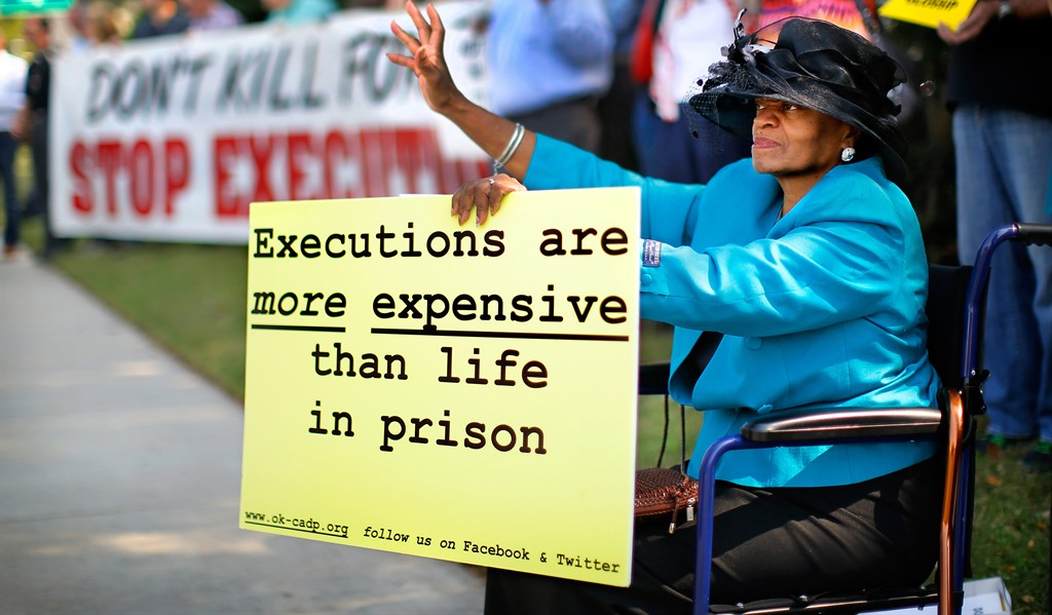The U.S. Supreme Court has agreed to take up a major capital punishment case out of Oklahoma. The court will hear the case of Richard Glossip, who has been on death row since 1998 after he was convicted of murder.
Glossip has maintained his innocence from the beginning. Later, major holes in the prosecution’s case were discovered, casting doubt on Glossip’s guilt. Nevertheless, he remains in prison awaiting his execution, which has sparked controversy in the overall discussion on capital punishment. The Supreme Court, however, is set to make a significant ruling in this case either way.
The Supreme Court agreed on Monday to take up the extraordinary appeal of an Oklahoma death row inmate named Richard Glossip, a man who even the state attorney general said should not be executed.
Last May the justices halted the pending execution while legal challenges played out.
Glossip has endured 26 years behind bars, nine execution dates, three last meals and two independent investigations that raised serious doubts about his conviction.
“We are grateful that the court is providing Richard Glossip the opportunity to argue that Oklahoma should not be permitted to kill him,” Glossip’s attorney, John Mills, said in a statement. “The court should reverse the Oklahoma Court of Criminal Appeals, which has inexplicably refused to accept the state’s confession of error.”
Oklahoma Attorney General Gentner F. Drummond told the Supreme Court that the state had recently made the “difficult decision” to confess error in Glossip’s case and supports vacating the conviction of Glossip. The move was an about-face and came after review of new information that had come to light related to prosecutorial misconduct at Glossip’s trial.
The Oklahoma Court of Criminal Appeals refused however, to accept the confession of error and determined the execution should go forward.
Glossip was convicted for being involved in a murder-for-hire plot to kill his boss.
The case began in 1997, when Glossip’s boss at the Best Budget Inn in Oklahoma City, Barry Van Treese, was murdered. Glossip, who was the hotel’s manager, was accused of conspiring with a maintenance worker named Justin Sneed to carry out the murder. Sneed confessed to the crime and claimed that Glossip had paid him to carry out the killing.
Glossip was tried and convicted of murder in 1998, based largely on Sneed’s testimony. He has been on death row ever since, fighting to prove his innocence and avoid execution. Over the years, a number of high-profile individuals and organizations have become involved in his case, including actress Susan Sarandon, who has been a vocal supporter of his cause.
One of the key problems in the case against Glossip is the reliability, or lack thereof, of Sneed’s testimony. Sneed initially claimed that he acted alone in the murder, but later changed his story and implicated Glossip. He was given a plea deal in exchange for his testimony, which some argue gave him an incentive to implicate Glossip in order to save himself from the death penalty.
Another issue in Glossip’s case is the lack of physical evidence tying him to the crime. There were no fingerprints or DNA found at the scene that could definitively link Glossip to the murder. Instead, the prosecution relied heavily on Sneed’s testimony and circumstantial evidence, such as Glossip’s presence at the hotel on the night of the murder.
Glossip’s attorneys have raised several concerns about the withholding of evidence and prosecutorial misconduct, especially related to Sneed’s mental health issues and credibility. If these concerns are proven to be valid, it would substantially undermine his conviction.
Also noteworthy is the willingness of Attorney General Drummond to advocate for Glossip at his clemency hearing. This is a rare action on the part of a top prosecutor. Both Democrat and Republican lawmakers have also spoken out on Glossip’s behalf.
The Supreme Court’s decision to take Glossip’s case is not only about one man’s fight for justice; it also represents a broader critique of the death penalty as states continue to grapple with debates over whether to continue the practice. The inevitability that innocent people will be sentenced to death and executed has been a major sticking point for those who oppose capital punishment. In this vein, the Supreme Court’s decision will have a major impact on Glossip’s case and perhaps others.













Join the conversation as a VIP Member